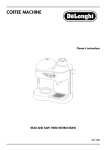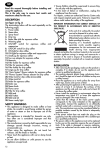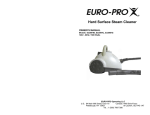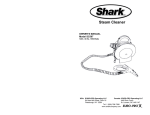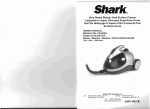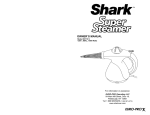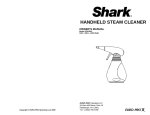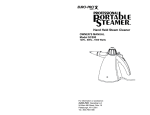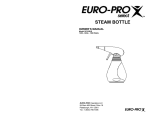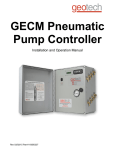Download De'Longhi CC80 User's Manual
Transcript
COFFEE MACHINE Owner’s instructions READ AND SAVE THESE INSTRUCTIONS CC80 2 D B C A E V F G U T H S I R O Q M P Z L N 3 1 2 3 4 5 6 7 8 10 MAX 4 9 10 11 12 B A 13 14 5 IMPORTANT SAFEGUARDS When using electrical appliances, basic safety precautions should always be followed, including the following: • Read all instructions. • Do not touch hot surfaces. Use handles and knobs. • To protect against fire, electrical shock and personal injury, do not immerse cord, plug or appliance in water or other liquid. • Close supervision is necessary when any appliance is used by or near children. • Unplug from the outlet when not in use and before cleaning. Allow to cool before fitting or taking off parts, and before cleaning the appliance. • Do not operate with a damaged cord or plug, or after the appliance malfunctions, or has been damaged in any manner. Return the appliance to the nearest authorized service facility for examination, repair or adjustment. • The use of accessory attachments or spare parts not recommended by the appliance manufacturer may result in fire, electrical shock or personal injury. • Do not use outdoors. • Do not let the cord hang over the edge of the table or counter, or touch hot surfaces. • Do not place on or near a hot gas or electrical burner, or in a heated oven. • To disconnect the appliance, turn any control to “off”, then remove plug from wall outlet. • Do not use the appliance for other than the intended use. • This appliance is for household use only. SAVE THESE INSTRUCTIONS SHORT CORD INSTRUCTIONS - - 6 A short power cord is provided to reduce risks resulting from becoming entangled in or tripping over a longer cord. Longer, detachable power supply cords or extension cords are available and may be used if care is exercised in their use. If an extension cord is used, the marked electrical rating should be at least as great as the electrical rating of the appliance. The longer cord should be arranged so that it will not drape over the counter-top or table top where it can be pulled on by children or tripped over. Your product is equipped with a polarized alternating current line plug (a plug having one blade wider than the other). This plug will fit into the power outlet only one way. This is a safety feature. If you are unable to insert the plug fully into the outlet, try reversing the plug. If the plug should still fail to fit, contact your electrician to replace your obsolete outlet. Do not defeat the safety purpose of the polarized plug. DESCRIPTION OF APPLIANCE CHLORINE FILTER (See drawing on page 3) These terms are referred to in the following pages. A. Water tank This filter removes the taste of chlorine from the water. Install as follows: • Remove the chlorine filter from its plastic bag and rinse under the tap. • Raise the coffee lid and lift out the filter holder (fig. 1). • Open the holder by pushing where indicated PUSH and fit the filter carefully as shown in fig. 2. • Close the holder and replace by pushing down well. • After 80 cycles or six months operation, the chlorine filter must be changed. The filter is of vegetable origin and can therefore be discarded with normal household rubbish. B. Coffee lid C. Chlorine filter D. Boiler cap E. Steam boiler F. Steam knob G. Emulsifier H. Milk tank I. Measure spoon L. Anti-spray hood M. “ON/OFF cappuccino” switch (steam boiler) N. Steam temperature OK light O. “ON/OFF cappuccino” light (steam boiler) P. Main “ON/OFF” coffee switch Q. Main “ON/OFF” coffee light R. Coffee filter S. Hot plate T. Water level indicator U. Carafe V. Filter holder Z Cleaning rod PREPARING THE COFFEE • Fill the carafe with cold water up to the level (marked on the carafe) which corresponds to the number of cups of coffee required (fig. 3). Warning: never exceed the 10 cup line to avoid water leaking from the machine's rear slots. • Pour the water into the tank (fig. 4). (The amount of coffee obtained will be slightly less than the amount of water poured into the tank because some of the water remains in the coffee powder and some is lost in steam). • Place the carafe on the hotplate (S) making sure the lid is on. The perforations in the lid serve to preserve the coffee's aroma, which is why the lid should be raised on the handle side in order for it to be opened. (fig.3) • Put the coffee in the filter by using the measuring spoon supplied and level it off uniformly (fig. 5). As a general rule, use a level measure of coffee (approx. 7 gr.) for each cup required (e.g. 10 measures to obtain 10 cups). However, the amount of coffee to be used can vary according to personal taste. • Use good quality medium ground coffee specially for coffee percolators. • Close the lid and press the "coffee" switch (fig. 6). The red "ON" light on the left of the switch shows that the machine is working. The coffee will begin to brew after a few seconds and will finish doing so at the sound of the characteristic gurgle which means the process has finished. It is entirely normal for the machine to emit steam during the coffee percolating or for a few drops of condensation to form around the lid. By leaving the "coffee" switch pressed after brewing, the hotplate (S) will keep the coffee in the carafe at just the right hot temperature. 7 PREPARING A CAPPUCCINO Filling the Boiler with Water • Unscrew the boiler cap (D) by turning it in an counter clockwise direction. • Fill the carafe with 6 oz (170 gr) maximum of water, corresponding to the amount needed to make one coffee (fig. 7). • Pour the water slowly into the boiler,first making sure that the “cappuccino” switch is off and that the steam knob is turned off. • WARNING: In order to fill the boiler when it is hot - for example immediately after the water contained in it has run out while a cappuccino is being made - no more than the above mentioned quantity of water (6 oz./170gr.) should be poured in, corresponding to the amount of water needed to make a coffee and never try to fill the boiler up to the MAX line (fig. 8) while it is still hot, otherwise the appliance will fail to froth the milk properly the next time. • Next close the steam boiler cap by turning it firmly clockwise. Note: for safety reasons it is not possible to open the cap when the steam boiler is warm because it turns without unscrewing; it is necessary to wait for all the water contained in the steam boiler to be completely used up in order to fill it, or else to wait for the boiler to cool down. • Be sure to add water in the boiler only once it is completely empty. Preparing the Milk for Cups of Cappuccino • Before dispensing milk, the boiler must be preheated for 10 minutes. Therefore, press the “CAPPUCCINO” button before preparing coffee; doing so, the boiler will heat right up. • Prepare the coffee as illustrated in the paragraph headed “PREPARING THE COFFEE” and pour about 2 fl. oz. (50-60 gr.) of coffee into each cup. • To make a cappuccino, pour into the tank milk which is neither boiling nor hot. With the tank filled to the “MAX” line, 2 or 3 cappuccinos can be made. Never exceed the little mark which is placed immediately above the word “MAX” (fig. 10) or the milk may continue to drip from the pipe after the cappuccino has been prepared. • Place the cup containing coffee under the milk tank pipe, check that the milk tank is firmly attached, wait for the “OK” pilot lamp (N) to come on, the turn the steam knob at least a full turn counter-clockwise. The “frothed” milk will begin to trickle out of the milk tank pipe (fig. 11). To avoid the milk splashing if 8 small cups are used, the anti-spray hood should be fitted on the milk tank pipe (fig. 12). • Fill the cup with the desired amount of frothed milk. To ensure that the milk froths properly, always close the steam knob and wait for the OK pilot lamp to come on between one cappuccino and the next. As soon as the tank is empty and the machine begins to puff, turn off the steam by turning the steam knob in a clockwise direction. • The following proportions are recommended in order to obtain a perfect cappuccino: 1/3 coffee, 1/3 hot milk and 1/3 frothed milk. Suggestion: to make a hotter cappuccino when more than one cup is required, it is better to pour one cup of coffee at a time before immediately filling it with frothed milk, rather than pouring all the cups of coffee at the same time first and then filling them with frothed milk.. • Before switching the boiler off it is necessary to clean the red emulsifier, so that it does not become blocked by the milk when it solidifies: to do so, fill the milk tank with a little water and turn the steam knob. In this way the steam cleans all the holes and emulsifier pipes and empties the internal circuits of any traces of milk. WARNING: to eliminate the “new” smell and above all to ensure that the appliance functions properly, a few coffee cycles should be completed without coffee powder the first time the appliance is used, and the steam boiler should be washed in the following way: fill it with water, press the ‘ON/OFF’ cappuccino switch and after 5 minutes turn the steam knob and leave it on until all the steam has been used up (about 15 minutes). CLEANING AND MAINTENANCE Before carrying out any cleaning or maintenance, disconnect the appliance from the electric power supply by pulling out the plug. Cleaning the Milk Frother Remember to clean the milk frother after each use as follows: • Remove the milk tank by pressing the lever marked “PRESS” and pulling it upwards at the same time; wash the tank with hot water. • Remove the emulsifier (fig. 13) by pressing on the lever (A) and pulling it upwards at the same time. Remove the rubber mixer, especially wash and clean with warm water the holes shown in fig. 14 (clean them using a needle). Check that the hole marked with the arrow B is not blocked (fig. 14). Once they have been cleaned, all the pieces must be reassembled correctly. Pay attention that the rubber mixer is firmly pushed down and the red emulsifier is pushed till you hear click. If the appliance is not cleaned this way every time it is used the milk may fail to froth properly or may fail to be sucked up, or it may drip from the milk tank pipe. Warning: to facilitate the cleaning of the milk tank pipe, it is possible to use the pipe brush supplied. Other Cleaning • The carafe, filter holder and permanent filter should be cleaned regularly. • Neither solvents nor abrasive detergents may be used for the cleaning of the machine's plastic components. A damp cloth is sufficient. • The machine must NEVER be immersed in water. DESCALING With the passing of time the calcium contained in the water will cause blocking which will prevent the machine from working properly. The machine should therefore be descaled at least every 40 cycles. Descaling should be carried out using the special coffee descalers which are on sale in most stores. White wine vinegar may be used as an alternative using the following procedure: • remove the anti-chlorine filter from the appliance (in order not to pollute it with vinegar); • pour 2 cups of white wine vinegar and 3 cups of water into the water tank; • place the carafe on the hotplate and the filter holder without the ground coffee; • press the "coffee" switch, allow the equivalent of one cup to percolate and then turn off the appliance; • leave the vinegar to work for an hour; • turn the machine back on and allow the rest of the solution to percolate; • rinse, using the appliance only with water for at least 3 cycles (3 complete tankfulls of water). Warning: never discale the boiler. SERVICE AND REPAIR If the appliance should break down or fail to work properly, contact the nearest authorized technical service centre. Repairs carried out by unauthorized staff will invalidate the guarantee. Limited Warranty What Does This Warranty Cover? We warrant each Espresso Coffee Machine to be free from defects in material and workmanship. Our obligation under this warranty is limited to replacement or repair, free of charge at our factory or authorized service centers, of any defective part or parts there of other than parts damaged in transit, which shall be returned to us, transportation prepaid. This warranty shall apply only if the Espresso Coffee Machine is used in accordance with the factory directions which accompany it. How Long Does The Coverage Last? This warranty runs for one year from the date of delivery and applies only to the original purchaser. What Does This Warranty Not Cover? This warranty does not cover defects or damage of the Espresso Coffee Machine which result from repairs or alterations to the machine outside our factory or authorized service centers, nor shall it apply to any Espresso Coffee Machine which has been subject to abuse, misuse, negligence or accidents. Also, consequential and incidental damages resulting from the use of this product or arising out of any breach of contract or breach of this warranty are not recoverable under this warranty. Some states do not allow the exclusion or limitation of incidental or consequential damages, so the above limitation may not apply to you. How Do You Get Service? If repairs become necessary or spare parts are needed, please write to: DeLonghi America Inc. 625, Washington Avenue Carlstadt N.J. 07072 or call Service Tel. No. 800-322-3848 The above warranty is in lieu of all other express warranties and representations; All implied warranties are limited to the applicable warranty period set forth above. This limitation does apply if you enter into an extended warranty with DeLonghi. Some states do not allow limitations on how long an implied warranty lasts, so the above exclusions connection with the sale or use of its Espresso Coffee Machine. How Does State Law Apply? This warranty gives you specific legal rights, and you may also have other rights which vary from state to state. 9









